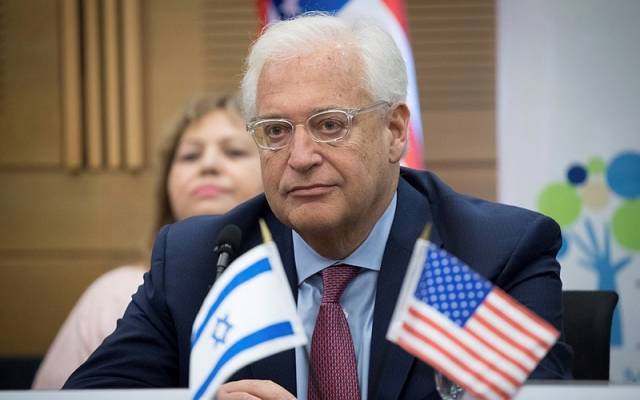The State Department clarified that US policy on the two-state solution “has not changed,” notwithstanding Ambassador David Friedman’s remarks.
The US ambassador to Israel raised eyebrows Thursday by saying that Israel occupies a tiny portion of Judea and Samaria — just two percent — and that settlements there are part of the Jewish state proper.
“I think the settlements are part of Israel,” American Ambassador David Friedman said in an interview with the Israeli news site Walla.
He refrained from answering when asked if ”settlements” – i.e. Jewish communities in Judea and Samaria – would be removed in a peace agreement with the Palestinians. “They (Israelis) are only occupying two percent of the West Bank,” he said.
A State Department spokeswoman later said Friedman’s remarks “should not be read as a change in U.S. policy.”
“I’m aware of what he said,” spokeswoman Heath Nauert told reporters in Washington. “His comments — and I want to be crystal clear about this — should not be read as a way to prejudge the outcome of any negotiations that the U.S. would have with the Israelis and the Palestinians. It should also not indicate a shift in U.S. policy.”
The Palestinians claim that the Jewish communities in Judea and Samaria are an obstacle to peace. Israel disputes this, saying the fate of the settlements must be resolved through negotiations with the Palestinians.
‘Israel Views the Settlers as Israelis,’ Friedman Says
“Obviously, there is important security considerations to those settlements, there’s important nationalistic, historical and religious significance to those settlements and I think the settlers view themselves as Israelis, and Israel views the settlers as Israelis,” Friedman said.
Nabil Shaath, an aide to Palestinian President Mahmoud Abbas, responded in a video clip on Twitter that the US ambassador had displayed “absolute ignorance of facts of law and of the position of the United States.”
Friedman’s remarks are “very bad news for the future of any American attempt to make peace in the Middle East,” Shaath added.
Senior Palestinian negotiator Saeb Erekat called Friedman’s comments “false and misleading.” He said in a statement that “such positions undermine ongoing efforts toward achieving a just and lasting peace between Israel and Palestine,” based on 1967 borders.
In discussing the broader geopolitical landscape for Israel in the year 2017, Friedman identified “more interest and flexibility in the Arab world generally,” commenting that “there are natural alliances between Israel and the Gulf, and Egypt and Jordan, that didn’t exist 10 years ago and those are going to be an important factor in contributing to opportunities.”
Two-State Solution ‘Lost its Meaning’
When pressed on the fate of the “two-state solution,” Friedman responded, “Conceivably I think that phrase has largely lost it’s meaning … it’s not a helpful term because it just doesn’t mean the same thing to different people.” Friedman concluded, “The solution comes first, then we deal with the label.”
Prime Minister Benjamin Netanyahu, at a recent ceremony at the Barkan Industrial Park marking 50 years of Jewish settlement in Samaria, asserted that “Israel will never withdraw from any Jewish settlement in Judea and Samaria.”
“This is the land of our fathers, this is our land. We are here to stay, forever,” Netanyahu stated. “There will be no uprooting of communities in the Land of Israel.”
By: AP and United with Israel Staff
